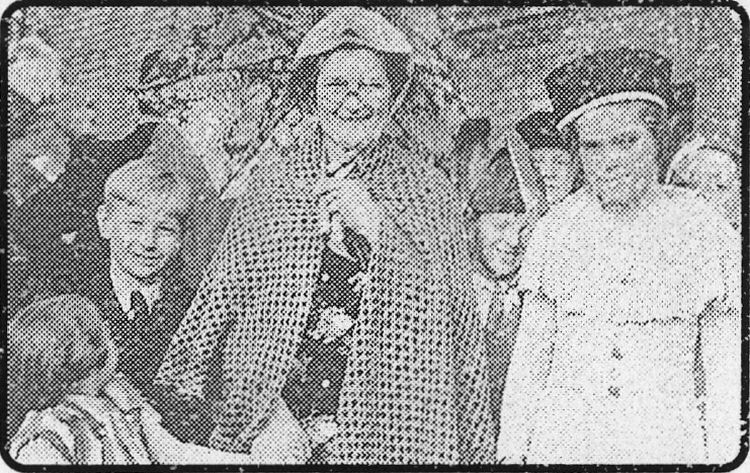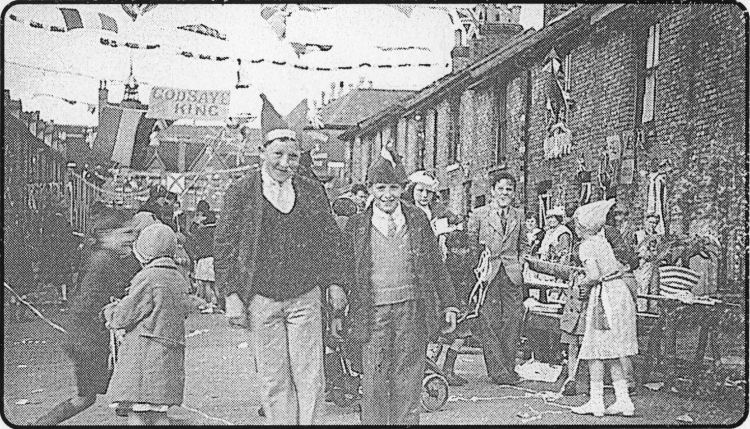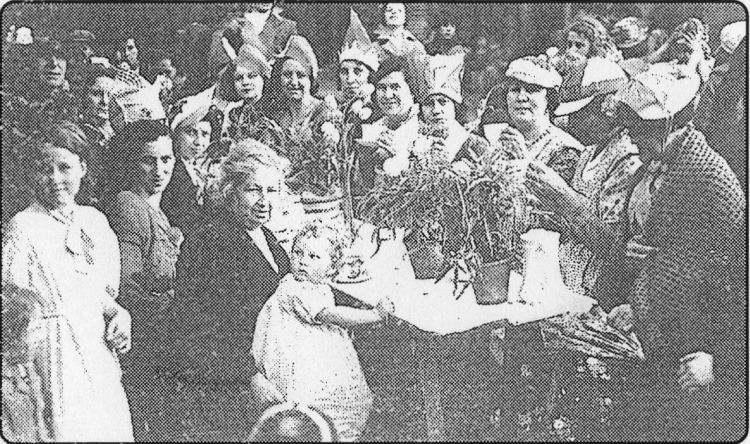
From the Folkestone Herald Published 22 June 2000
Street party.
AUTHOR and local history enthusiast Alan Taylor, of St Michael’s Street, who
has four books on old Folkestone under his belt, was delighted a while ago
to receive a collection of old coloured magic lantern slides and black and
white photographs of the town taken in years gone by, from Mrs Gwen Hoad, of
Astead, Surrey.
They were pictures taken by her late father, J.F. Smith, who was a
pharmacist at Chas Taylor & Son, chemists, at 47 Canterbury Road,
Folkestone.
An amateur photographer
Mr Smith took the photographs between 1923 and 1938.
He was the secretary of the Folkestone Camera Club around the time it was
formed in 1935.
And he was quite a good lensman, as they say. He entered one of his slides of the local celebrations
of the Coronation of King George VI and Queen Elizabeth (now the Queen
Mother) in 1937.
The competition was run by the Daily Express.
£200 winner.
He captioned his picture “Happy smiles after the Coronation Tea” and it won
him a £200 prize - which was a tidy sum in those days.
That success spurred him on to better things and he left Folkestone in 1938
to buy his own business - and the £200 prize he invested in his new venture.
Alan Taylor has had prints made from the old slides and pretty good they are
too. And he has been busy chasing up names for captions for his prints! A
selection taken in Bridge Street are featured here, sadly not in colour! I
hope to feature one or two more next week.
I was pleased to hear last week that a group of former Dover Road School
boys who were evacuated to South Wales for safety in the Second World War
had a good trip down Memory Lane this month.
Ron Dutt, of St Michael’s Street, made the trip with Ron Doughty, now living
in Gillingham, and tells me they joined up with John Garnham, who now lives
near Raglan, and Cyril Blunt, of Llantilio Pertholey, whose father, as
headmaster at Dover Road School, was in charge of the evacuees in Raglan.
His name was also Cyril.
It was Ron Doughty who appealed through the Herald for press cuttings and
other details about the evacuation to Wales and, through Memories got to
meet again some of his fellow evacuees.
He recalled the then black moment that he and Ron stepped off the train on
arrival in Raglan close on 50 years ago clutching gas masks carried in
cardboard boxes and wearing brown name tags. Understandably they were very homesick!
Ron Dutt proudly showed me a copy of a local Monmouth paper which used a
picture feature about the party and their meeting with a fellow pupil at
Raglan and now Councillor Mrs Marjorie Chilcott.
Mrs Chilcott rook the party on a tour of their old school and the
village, and they also visited Raglan Castle and at the church met two
of Raglan's octogenarians whose homes were thrown open to the young
evacuees in the war.

Picture above: The lady with shawl is Florence Morrison who is pictured
with Freddie Heron & Mrs Elizabeth (Li) Hogben (nee Morrison) her daughter.

BRIDGE Street Coronation Tea Party, on May 12,1937. Left of centre the
bigger boy is ‘Jumbo’ Bates, followed by Freddie Heron. George Spurgen
School can be seen in the background in the original picture.

LEFT of table from the front are: Dorothy Hussey, Mrs Leggett, Eddie
Spelzine, Lucy Leggett and Angela Sutton (junior.) Right, from the front:
Florence Morrison, Angela Sutton, Mrs Ewins, Mrs Blackman, Angela Philpott,
Dolly Reed, Hester & Rosie Sutton.
 |
|
1900
Deputation to protest at rail fares rise as hotels hit.
AN INCREASE in the rail excursion fare from London to
Folkestone, from 4 shillings to 6 shillings, was having a serious
impact on hotels which were experiencing a big fall-off in visitors as a
result of the increase which was said to be caused by increases in fuel
and material costs. However, it was claimed the increase was imposed to
stop people travelling to the Paris Exhibition at a cheap rate. After
hearing from local hotels of the number of groups of people who had
cancelled visits to the town because of the increases, it was decided to
send a deputation to the South Eastern Railway company to protest about
the rise. Two more contingents of around 200 wounded soldiers from South
Africa arrived at Beach Rocks Convalescent Home at Sandgate after a
three-week voyage to Southampton. Most of the second party were injured
in one of the British setbacks In the Boer War at the notorious
strongpoint of Spion Kop. But following later battles which routed the
Boers, back in England many people began planning for what was
optimistically thought would soon be the end of the War. Folkestone had
a Town Hall meeting to form a committee to organise celebrations.
|
|
1925
£20,000 plans to expand Harvey Grammar School.
PLANS were approved by the local education committee to extend Harvey Grammar School In Chariton Road to
house an additional 100 pupils, taking the total to 300, at a cost of
£20,000. Included in the plans was an extension of the school playing
fields over an adjoining acre of land. The plans required approval of
the Borough Council and the Kent Education Committee. One reason for the
plan was that the existing lease of one of the school buildings, Pelham
House, was soon to run out. Another was lack of space for advanced
teaching classes. The Chamber of Commerce called on the Town Council to
take steps to buy the seafront and Marine Gardens and to develop them so
that ultimately they would become a source of income for the town and
would lead to more visitors being attracted to Folkestone. Swingtraig
agreed to form a branch of the charity cost raining organisation, the
Folkestone Brotherhood or Central Sparrows which was the main supporters
of the Victoria Hospital which, in these days; was funded.
This followed an open air public meeting close to the church. Similar
meetings were held at Hawkinge and Paddlesworth where it was agreed
they would support the forthcoming two-day summer fete organised by the
Cheerful Sparrows.
|
|
1950
Town must back Festival of Britain with more cash.
THE EDITOR took a dim view of the paltry £500 the Council
intended to contribute towards the UK's Festival of Britain, suggesting
that, as a major resort, the town should fork out much more. It was
ridiculous, he said. It was the ‘event of the century' and should be
treated as such. It would be immeasurably worth it if they spent a penny
rate - £2,000. Everyone would benefit from good publicity for the
resort. At Hythe the council was proposing to buy seven acres of land
for housing from the Army, to the west of Cinque Ports Avenue. Trustees
of the Hospitals of St Bartholomew and St John, Hythe appointed a new
chairman, Alderman P Spicer. This followed the resignation, after 17
years association with the trustees of Mr S Keeler JP. Future plan3
involved the proposed sale of St Bart’s to meet part of the cost of
renovation and modernisation of St Johns to house 14 old people, each in
a bedsit with use of kitchens etc. Folkestone Chamber of Commerce was
calling on British Railways to re-consider the possibility of operating
a car ferry service to France in winter as well as summer, as well as
passenger boats to Calais. It had already been shown, they pointed out,
the ferry Dinard could cope adequately with cars on their way to the
Monte Carlo Rally.
|
|
1975
Alert lorry driver averts risk of serious explosion.
A LORRY driver averted a potential disaster in Folkestone
after he spotted a fire in his vehicle when ho stopped to ask directions
to the Leas from Earls Avenue. He jumped out as flames licked around
six bottles of propane gas and proceed to throw them clear before there
was a serious explosion. Roy Dungey from Wye said “If I hadn't stopped
to ask the way the lorry could have blown up as I drove along.”
Folkestone firemen put out the fire. A new military unit equipped with a
fleet of 25 Land Rovers and supplies ready to meet disasters world-wide
was set up on permanent standby at Shorncliffe Camp ready for any
emergency. A Department of Environment spokesman explained many
disasters were aggravated by the fact relief supplies did not get
through on time. The new unit was an attempt to improve the situation. A
move to save plans for council flats at Hythe failed. Shepway Council
decided the flats to be built on former School of Infantry land off
Military Road should be re-designed after objections to the design. One
councillor sought to eave money by getting existing plans modified, ’his
was after members wore told re-designing could cost £25,000 in higher
building charges. To improve its service the East Kent Road Car
Company appointed new district service inspectors to check on levels
of service, bus connections, the sighting of bus stops, marketing ahd
publicity.
|
|




